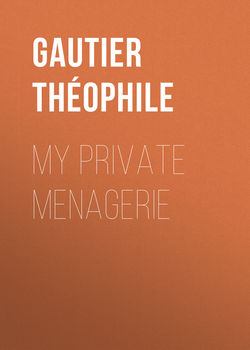Читать книгу My Private Menagerie - Gautier Théophile - Страница 2
II
THE WHITE DYNASTY
ОглавлениеLet me come to more recent times. A cat brought from Havana by Mlle. Aïta de la Penuela, a young Spanish artist whose studies of white angora cats used to adorn and still adorn the show-windows of the print-sellers, gave birth to the daintiest little kitten, exactly like the puffs used for the application of face powder, which kitten was presented to me. Its immaculate whiteness caused it to be named Pierrot, and this appellation, when it grew up, developed into Don Pierrot of Navarre, which was infinitely more majestic and smacked of a grandee of Spain.
Don Pierrot, like all animals that are fondled and petted, became delightfully amiable, and shared the life of the household with that fulness of satisfaction cats derive from close association with the fireside. Seated in his customary place, close to the fire, he really looked as if he understood the conversation and was interested in it. He followed the speakers with his eyes, and every now and then would utter a little cry, exactly as if to object and give his own opinion upon literature, which formed the staple of our talks. He was very fond of books, and when he found one open on the table, he would lie down by it, gaze attentively at the page and turn the leaves with his claws; then he ended by going to sleep, just as if he had really been reading a fashionable novel. As soon as I picked up my pen, he would leap upon the desk, and watch attentively the steel nib scribbling away on the paper, moving his head every time I began a new line. Sometimes he endeavoured to collaborate with me, and would snatch the pen out of my hand, no doubt with the intention of writing in his turn, for he was as æsthetic a cat as Hoffmann’s Murr. Indeed, I strongly suspect that he was in the habit of inditing his memoirs, at night, in some gutter or another, by the light of his own phosphorescent eyes. Unfortunately, these lucubrations are lost.
Don Pierrot of Navarre always sat up at night until I came home, waiting for me on the inside of the door, and as soon as I stepped into the antechamber he would come rubbing himself against my legs, arching his back and purring in gladsome, friendly fashion. Then he would start to walk in front of me, preceding me like a page, and I am sure that if I had asked him to do so, he would have carried my candle. In this way he would escort me to my bedroom, wait until I had undressed, jump up on the bed, put his paws round my neck, rub his nose against mine, lick me with his tiny red tongue, rough as a file, and utter little inarticulate cries by way of expressing unmistakably the pleasure he felt at seeing me again. When he had sufficiently caressed me and it was time to sleep he used to perch upon the backboard of his bed and slept there like a bird roosting on a branch. As soon as I woke in the morning, he would come and stretch out beside me until I rose.
Midnight was the latest time allowed for my return home. On this point Pierrot was as inflexible as a janitor. Now, at that time I had founded, along with a few friends, a little evening reunion called “The Four Candles Society,” the place of meeting happening to be lighted by four candles stuck in silver candlesticks placed at each corner of the table. Occasionally the conversation became so absorbing that I would forget the time, even at the risk of seeing, like Cinderella, my carriage turn into a pumpkin and my coachman into a big rat. Twice or thrice Pierrot sat up for me until two o’clock in the morning, but presently he took offence at my conduct and went to bed without waiting for me. I was touched by this mute protest against my innocently disorderly way of life, and thereafter I regularly returned home at midnight. Pierrot, however, proved hard to win back; he wanted to make sure that my repentance was no mere passing matter, but once he was convinced that I had really reformed, he deigned to restore me to his good graces and again took up his nightly post in the antechamber.
It is no easy matter to win a cat’s love, for cats are philosophical, sedate, quiet animals, fond of their own way, liking cleanliness and order, and not apt to bestow their affection hastily. They are quite willing to be friends, if you prove worthy of their friendship, but they decline to be slaves. They are affectionate, but they exercise free will, and will not do for you what they consider to be unreasonable. Once, however, they have bestowed their friendship, their trust is absolute, and their affection most faithful. They become one’s companions in hours of solitude, sadness, and labour. A cat will stay on your knees a whole evening, purring away, happy in your company and careless of that of its own species. In vain do mewings sound on the roofs, inviting it to one of the cat parties where red herring brine takes the place of tea; it is not to be tempted and spends the evening with you. If you put it down, it is back in a jiffy with a kind of cooing that sounds like a gentle reproach. Sometimes, sitting up in front of you, it looks at you so softly, so tenderly, so caressingly, and in so human a way that it is almost terrifying, for it is impossible to believe that there is no mind back of those eyes.
